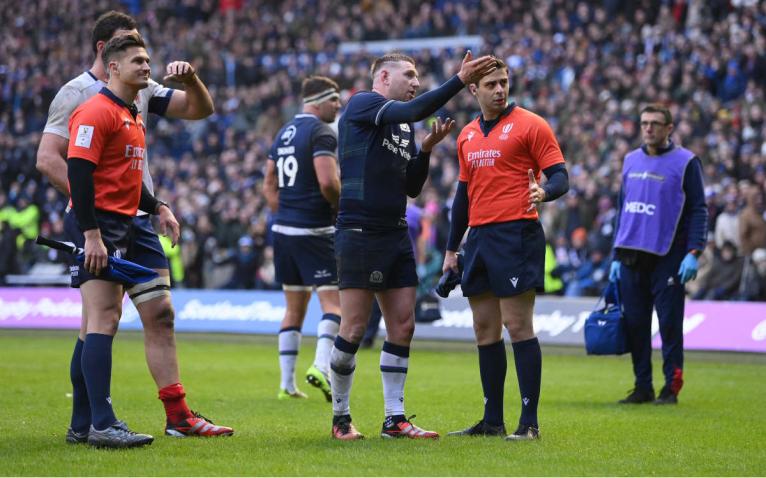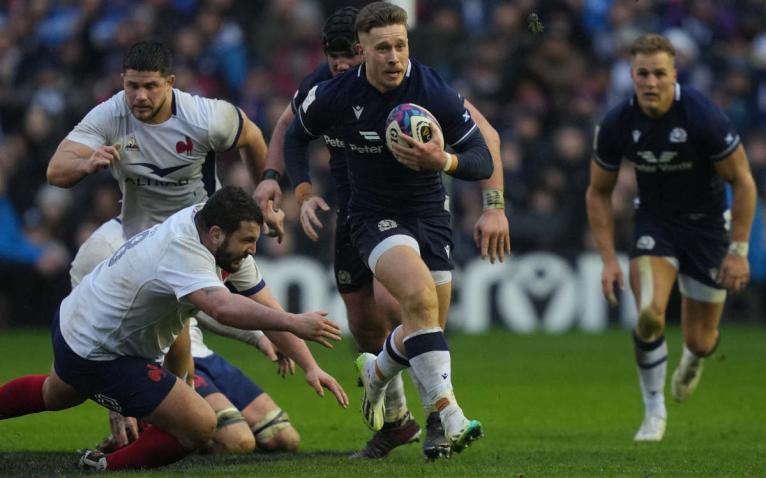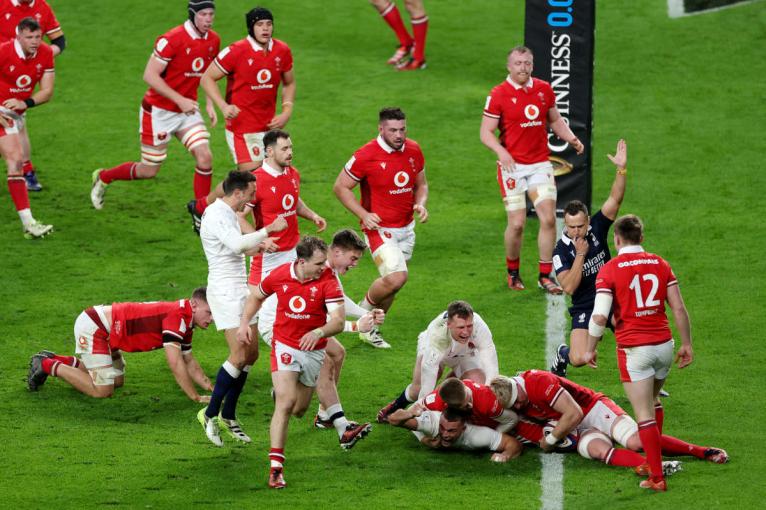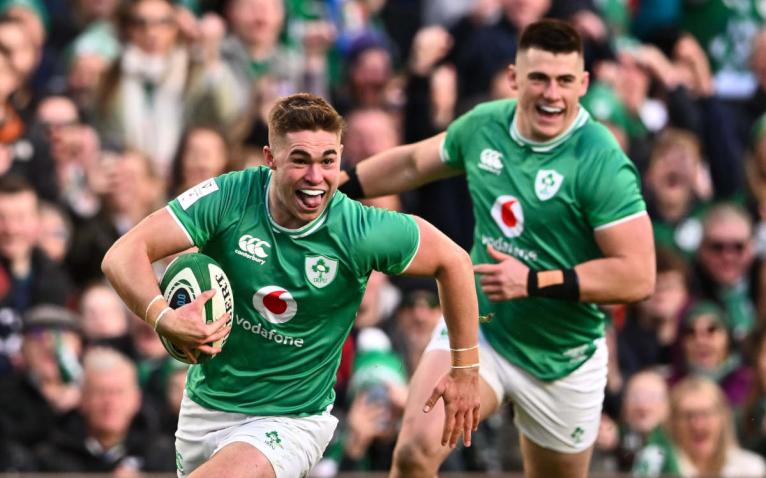It’s not often you get to the end of a rugby match and end up mired in a paradox of quantum superposition. Hey, it’s a simple game. But at Murrayfield on Saturday in the dying embers of a scrap-fest between Scotland and France, we had a match decided by a last-gasp score which, simultaneously, was a try and yet wasn’t; if you like, Schrödinger’s Try, which, given he wasn’t even on the pitch, was some effort from the eminent Austrian.
Was the ball fairly grounded? Very probably; better than that, almost certainly. But the key word there isn’t ‘probably’ or ‘certainly’ but ‘almost’. To overturn referee Nic Berry – ‘Brian, coming to you here, mate. I’ve got the ball held up’ – the TMO, Brian MacNeice, needed to see clear and obvious evidence that the ball was grounded. No question, he was thorough – it was an interminable, four-minute 20 second deliberation – and while he initially seemed to think the ball was down – and indeed said as much – ultimately, he couldn’t be certain. So no try.
To say the least, it’s ironic that a verdict of ‘not proven’ should stiff the one country in the world that still – though not for much longer – offers it as an option to a jury; effectively, ‘look, we all know you chinned him, pal, but there’s drop-out on the CCTV’. As any Edinburgh lawyer will tell you, ‘not proven’ is a godsend for the defence; less so for the likes of Sam Skinner.
Scotland Head Coach, Gregor Townsend, summed up the national mood. ‘I don’t know why … [the TMO] … changed his decision,’ he said. ‘We were celebrating in the coaches’ box. We could hear the TMO’s conversation with the referee. He was saying the ball was on the foot, then the ball was down. And then he changes his mind and says: ‘Stick with the on-field decision.’ I don’t understand the rationale. I don’t know what you can say.’

And you have to sympathise. As the Australian coach, Bob Dwyer, once said in a similar situation: ‘He’s lying on the ball in the in-goal area; that’s a try, isn’t it?’ Put it this way, one publicity-hungry bookmaker has already offered to refund all losing bets on Scotland to beat France: ‘Justice Refund For Rugby Punters As Scotland Robbed,’ it trumpeted on its website. Trust me, when bookmakers are handing back money, you’re in a different time warp.
But – and whisper this very, very quietly in The Borders – by the letter of the law the officials were right. ‘Clear and obvious’ effectively demands certainty. Did Brian MacNeice have a conclusive, copper-bottomed, bullet-proof view of the ball (a) on the ground and (b) on or over the try-line. Ultimately – and he’s allowed to change his mind as the angles roll in – he felt he didn’t, in which case he couldn’t overturn Nic Berry’s on-field call. Look, these are honest guys doing their level best with technology which – good as it is – isn’t a magic bullet.
Given a call in their favour would’ve left them England and Italy shy of a tilt at a Grand Slam, it’s a tough one to swallow. As the mesmeric Barry Keoghan tells the equally mesmeric Kerry Condon in The Banshees of Inisherin; ‘Ah well; there goes another dream’.
Is there a smarter alternative? I’m not sure there is. The time-honoured, legal phrase ‘beyond reasonable doubt’ is one possibility, except that the courts have now dumped it in favour of the word ‘sure’. I suppose we could always go back to the – vastly overrated – ‘good old days’ and the balance of probabilities; namely, if it looks like a duck, walks like a duck and quacks like a duck, then it’s a duck. Either way, though, that’s a whole new box of frogs.
Look, it’s tough on Scotland but the fundamental premise of the sport – of any sport – is that while you may not like the officials’ decision, you’re required to lump it. But given a call in their favour would’ve left them England and Italy shy of a tilt at a Grand Slam, it’s a tough one to swallow. As the mesmeric Barry Keoghan tells the equally mesmeric Kerry Condon in The Banshees of Inisherin; ‘Ah well; there goes another dream’.

But as Gregor Townsend will know, his team should’ve nailed down the lid earlier. A disjointed France were there for the taking but Scotland, for far too long in that second half, seemed preoccupied with not losing rather than winning. And no question, the game should’ve been grabbed by the scruff of its neck at the back end of the first-half with Uini Atonio in the bin of sin. Except Scotland couldn’t convert five minutes of prime real estate into points.
So, a win that, in some ways, felt like a defeat has been followed by a defeat that, in some ways, felt like a win: such is Scotland’s lot so far in this Six Nations. Should’ve, could’ve, might’ve; it’s becoming an all-too-familiar refrain. But you have to say, Scotland ain’t having much luck; stiffed by the World Cup draw and stiffed now by an Austrian quantum physicist and his eponymous cat. Yet another log on what’s already a roaring fire.
But in full-back, Harry Paterson, there was a glimmer of light on a dark day. Chucked in at ten o’clock after Mrs Steyn went into labour – just his eighth start in senior rugby and up against one of the foremost teams in the world at a moist Murrayfield – he turned in what Gregor Townsend described as ‘one of the best debuts I’ve ever seen.’ And Gregor was spot-on; the kid was just fabulous.
England promised to serve their starving public Beef Wellington but ended up reverting to the tried and trusted fish and chips; rescued, yet again, by the rugby nous of George Ford. His clutch 50:22 late in the second half was pure Patrick Mahomes
But it was the French ‘jeunes’ who ultimately won it; Nolan Le Garrec’s vision and Louis Baille-Biarry’s brilliance – ‘the electric scooter’ – turning the game on its head. Elsewhere, Gregory Aldritt was the French standard-bearer, Cyrille Baille and Francois Cros were indomitable but, bizarrely, the normally magnificent Mathieu Jalibert was at sixes and sevens all afternoon. It was like watching Cezanne painting square pears.
South of The Wall, England promised to serve their starving public Beef Wellington but ended up reverting to the tried and trusted fish and chips; rescued, yet again, by the rugby nous of George Ford. His clutch 50:22 late in the second half was pure Patrick Mahomes; flushed out of the pocket, a sack on two legs, yet somehow making the play that swung the game.
The worry for England is that if you strip Maro Itoje, Ben Earl, George Ford and Freddie Steward out of this side, what exactly do you have left? Itoje was simply immense, a Reffell-esque pain in the backside; Earl continues to offer conclusive proof that – in ignoring him for so long – Eddie Jones is a buffoon; Ford is a one-man cheat code and Steward edges ever closer to world-class.

But, as a somewhat vexed Lawrence Dallaglio said in the aftermath, ‘England look more comfortable without the ball than with it’, although given the first half sin bins and the penalty count, even that was debatable. What’s indisputable is that save Elliot Daly’s fly-paper hands and Ben Earl’s phenomenal, four-wheel drive traction, England offered little or no spark ball in hand.
Steve Borthwick was in full ‘cut and paste’ mode in the aftermath; ‘We’re all aware that we’re going to make mistakes …proud of the way the players stayed in the fight … this is a team that finds a way to win … what’s important is that we enjoy tonight.’ Frankly, the England Head Coach needs to freshen up more than just his team’s attacking options.
Warren Gatland will have been steaming back down the M4; this, I should say, is a reference to his mood rather than the speed of the bus. When his team plays, they’re a handful. In the first half against England and in the second half against Scotland, they’ve scored 40 points yet in the second half against England and in the first half against Scotland, they’ve scored zilch. There can be no better definition of acute frustration.
Ireland’s cuffing of Italy was as predictable as a tax demand; one team that revels in chaos and another that creates its own. Andy Farrell will be quietly delighted with a six-try shutout and with the geometric progression of the likes of Jack Crowley and Calvin Nash.
But the battle of the benches – emphatically and almost inevitably – went England’s way, not least in the front row. At one point, debutant Archie Griffin – yet to start a Premiership game for Bath – and Corey Domachowski were nose-to-nose with Dan Cole and Ellis Genge; eight caps versus 168. As your builder would say, it is what it is, but while losing by a point to Scotland and by two to England will be an utter infuriation, the wider picture for Wales is hugely encouraging.
Ireland’s cuffing of Italy was as predictable as a tax demand; one team that revels in chaos and another that creates its own. Andy Farrell will be quietly delighted with a six-try shutout and with the geometric progression of the likes of Jack Crowley and Calvin Nash. Italy, though, just concede too much time and space, too many penalties and too many unforced errors. And yet, post-France, they have Scotland and Wales up their sleeves. There are still possibilities.

As ever, though, it was an eclectic Six Nations weekend. In the BBC studio on Saturday, we had Benjamin Kayser wearing hi-vis, gardening gloves and in the ITV studio on Sunday, Brian O’Driscoll’s top pocket, polka dot handkerchief was a delicious counter-point to the studious spectacles. Much as he may now resemble a youthful, Emeritus Professor of Literature at Trinity College, Dublin, he remains – by the width of O’Connell Street – the best rugby analyst on the box.
For sheer entertainment value, though, not much beat Finn Russell being chop-tackled by a basket of water-bottles. No question, it looked a straight yellow – Finn was nowhere near the ball – but Nic Berry was having none if it. Schrödinger’s try was quite enough for one afternoon; Schrödinger’s water-bottles might’ve just stretched surreality to breaking point.



Schrödinger’s Try very clever.
I wonder if such a thing happened again, and often in the last minute or so a team is trying to get over the line and another team is trying equally to stop the try.
I guess the TMO opened the box or tried to?
New rule if held up in last play, attacking team get to take a tap and go, 5 m out from where the ball was held up. Play until next infringement -without the box with a radioactive atom, Geiger counter, vial of poison, and hammer.
Decision made
Suck it up
Stop bleating about it and move on
Easy to criticise with no solution?
Here’s the solution:
Rugby League was revolutionised when the 5M behind the ruck rule was changed to 10M. The referee stands on the 10M line, not so close to the ruck and sees less.
Rugby union referees run around the ruck like lunatics yelling instructions and looking for penalties they can award.
Change behind the last foot to 5M and all is solved with a much more open game, less offside penalties and less officiating from referees.
Say what you will, Scotland was robbed of a deserved win because referees are too technical, hair splitting, pedantic and punishing.
Refereeing is too technical, hair splitting, pedantic and time consuming.
The public have been telling rugby administrators these truths forever.
Nick Berry did not stop telling players of both teams how to play the game from kickoff to the final whistle.
Rugby teams don’t want to play any rugby in their own half because referees are too technical, hair splitting, pedantic and punishing.
With all the technology around (it started with Hawkeye in cricket 25 years ago!) you would have thought that someone would have been able to come up with some idea or other for rugby? Oh no, sorry, of course the amateurs in the English RFU would have vetoed it I'm sure. Moving on…
It was a fricking try. Sorry Scotland, I feel for you x
Clearly a try. The sooner they get rid of the TMO’s the better the games will be. These TMO’s ego’s and attitudes of ‘we know best’ are a blight on the game. As rugby fans, how long do we have to put up with this cr**?
The commentary is the winner on the day!! Love it!!
It should be the referee who makes the final decision, getting like VAR (FOOTBALL)